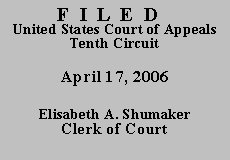

SHIRLEY ELAINE CLOYD,
Petitioner-Appellant,
v.
MILLICENT NEWTON-EMBRY,
Respondent-Appellee.
Before KELLY, McKAY, and
LUCERO, Circuit Judges.
After examining the briefs and the appellate record, this panel has
determined unanimously that oral argument would not materially assist the
determination of this appeal. See Fed. R. App. P. 34(a)(2). The case is therefore
ordered submitted without oral argument.
Ms. Cloyd, who appears pro se, is currently an inmate in Oklahoma state prison and challenges her state court sentence under 28 U.S.C. § 2254. Police officers executed a no-knock warrant that was based on suspicion of drugs and weapons at Ms. Cloyd's home. After the officer entered her home, Ms. Cloyd fired several gunshots at one of the officers. A jury found Ms. Cloyd guilty of shooting with intent to kill, intent to manufacture a controlled substance, possession of a firearm during commission of a felony, possession with intent to distribute a controlled substance, possession of simulated explosive devices, and possession of drug paraphernalia. Her conviction was subsequently upheld by the Oklahoma Court of Criminal Appeals.
In her § 2254 petition, Ms. Cloyd alleges (1) that the judge violated her due process rights by allowing the jurors to ask questions, (2) that the jury instructions rendered her trial fundamentally unfair, (3) ineffective assistance of counsel, (4) that there was insufficient evidence to support her conviction, (5) that her conviction violated her right against double jeopardy, (6) that her sentence was excessive, and (7) that the cumulative error warrants relief from the sentence. The magistrate judge recommended in a detailed report that Ms. Cloyd's petition be denied on the merits. Report and Recommendation, 1 (W.D. Okla. Mar. 16, 2005). Ms. Cloyd failed to object to the magistrate judge's recommendation, and the district court, after a de novo review of the recommendation, adopted the magistrate judge's recommendation and dismissed Ms. Cloyd's petition. Order, 2 (W.D. Okla. Apr. 12, 2005).
In a May 2, 2005, order of this court, we requested that Ms. Cloyd discuss whether she had waived her right to appeal the petition's dismissal when she failed to object to the magistrate judge's report. A failure to object to the magistrate judge's report generally precludes our review of the district court's decision. See Sealock v. Colorado, 218 F.3d 1205, 1209 (10th Cir. 2000). In response to our request, Ms. Cloyd argues to this court that she should be excused from this requirement because (1) she is a pro se litigant, and (2) because the jail-house lawyer who was helping her with her case was paroled and took Ms. Cloyd's legal files with her, with the promise that she would continue to help Ms. Cloyd. We do not hold pro se litigants to the same exacting standards as represented litigants. See, e.g., Haines v. Kerner, 404 U.S. 519, 520-21 (1972). And in support of her claim regarding the jail-house lawyer, Ms. Cloyd presented the affidavits of three fellow inmates, each of whom supports Ms. Cloyd's experience with the jail-house lawyer. Finally, we note that the rules governing district court review of the magistrate judge's recommendation instructs the district court to limit its de novo review to "any portion of the magistrate judge's disposition to which specific written objection has been made . . . ." United States v. One Parcel of Real Property, with Buildings, Appurtenances, Improvements, and Contents, Known as: 2121 East 30th Street, Tulsa, Oklahoma, 73 F.3d 1057, 1059 (10th Cir. 1996). In this case, the district court, even without any objection from Ms. Cloyd, conducted a "de novo review of the record" and adopted the magistrate judge's recommendation. Order, supra, at 1. Because Ms. Cloyd is a pro se litigant and she has provided a reason to excuse her failure to object, and because the district court on its own accord conducted a de novo review, we excuse her failure to object to the magistrate judge's recommendation and review Ms. Cloyd's petition.
We must first address Ms. Cloyd's motion for issuance of a certificate of appealability. To obtain a certificate of appealability, she must make a "substantial showing of the denial of a constitutional right." 28 U.S.C. § 2253(c)(2) (1994). To meet this burden, Ms. Cloyd must demonstrate "that reasonable jurists could debate whether (or, for that matter, agree that) the petition should have been resolved in a different manner or that the issues presented were adequate to deserve encouragement to proceed further." Slack v. McDaniel, 529 U.S. 473, 484 (2000) (quotation omitted).
We have carefully reviewed Ms. Cloyd's brief, the district court's disposition, the magistrate judge's recommendation, and the record on appeal. Nothing in the facts, the record on appeal, or Ms. Cloyd's filing raises an issue which meets our standard for the grant of a certificate of appealability. For substantially the same reasons set forth by the magistrate judge and adopted by the district court in its Order of April 12, 2005, we cannot say "that reasonable jurists could debate whether (or, for that matter, agree that) the petition should have been resolved in a different manner." Id.
We DENY Ms. Cloyd's request for a certificate of appealability and DISMISS the appeal. We GRANT Ms. Cloyd's petition to proceed in forma pauperis.
Entered for the Court
Monroe G. McKay
Circuit Judge